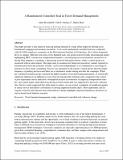A randomized controlled trial in travel demand management
Author(s)
Rosenfield, Adam (Adam Isaac); Attanucci, John P; Zhao, Jinhua
DownloadAccepted version (1.634Mb)
Open Access Policy
Open Access Policy
Creative Commons Attribution-Noncommercial-Share Alike
Terms of use
Metadata
Show full item recordAbstract
© 2019, Springer Science+Business Media, LLC, part of Springer Nature. This paper presents a trial aimed at reducing parking demand at a large urban employer through an informational campaign and monetary incentives. A 6-week randomized controlled trial was conducted with (N = 2000) employee commuters at the Massachusetts Institute of Technology, all of whom frequently drove to campus. Split into four arms of five hundred each, one group received weekly informational emails highlighting MIT’s various new transportation benefits; a second group received monetary rewards for reducing their frequency of parking; a third group received both interventions, while a control group was monitored with no intervention. The paper aims to examine how behavioral incentives, namely targeted information provision and monetary rewards, can be used independently or in combination to encourage alternatives to drive-alone commuting. Success was measured as the extent to which drivers decreased their frequency of parking and increased their use of alternative modes during and after the campaign. While the combined treatment group contained the highest number of top-performing participants, no statistically significant differences-in-differences were observed amongst the treatment arms compared to the control. A post-experiment survey indicated a widespread increase in awareness of employer transportation benefits, and a much larger stated shift from driving towards transit than was supported by passively-collected data. Survey results suggested that while intent to reduce car use existed, complaints of insufficient quality of transit service and relative convenience of driving suppressed modal shifts. Most importantly, the discrepancy between self-reported and actual behavior change highlights important limitations and biases of survey-based travel behavior research.
Date issued
2019-06Department
Massachusetts Institute of Technology. Department of Civil and Environmental Engineering; Massachusetts Institute of Technology. Department of Urban Studies and PlanningJournal
Transportation
Publisher
Springer Science and Business Media LLC
Citation
Rosenfield, Adam et al. "A randomized controlled trial in travel demand management." Transportation 47, 4 (June 2019): 1907–1932 © 2019 Springer Nature
Version: Author's final manuscript
ISSN
0049-4488
1572-9435